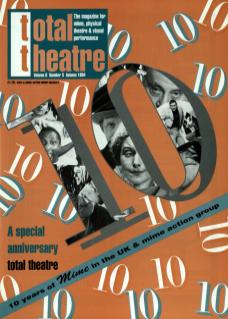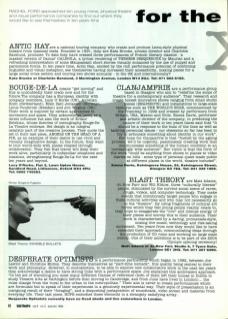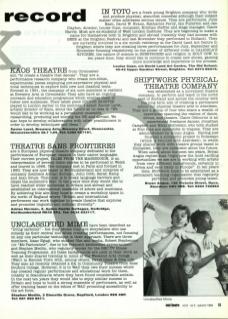ANTIC HAY are a national touring company who create and produce Lecoq-style physical theatre from classical texts. Founded in 1991, they are Kate Brooke, artistic director, and Charlotte Barslund, producer. To date they have created three performances of French literary classics – a masked version of Camus' Caligula, a lyrical rendering of Therese Desqueroux by Mauriac and a refreshing interpretation of some Maupassant short stories visually enhanced by the use of puppet and pantomime forms. In ten years time, Antic Hay, excited by the rich performance potential of combining linguistic and visual metaphor, see themselves having increased their accessibility, making pieces for a large social cross section and touring two shows annually – in the UK and internationally?
BOUGE-DE-LA means ‘get moving’ and this is undoubtedly their credo now and for the future. The company has a European identity with company members, Lucy O'Rorke (UK), Aurelian Koch (Switzerland), Ellen Zahl Jonassen (Norway), Linus Tunstrom (Sweden), and Jon Wygens (UK). Their work is inspired by certain approaches to movement and space. They acknowledge Lecoq as a direct influence but also the work of Krikor Belekian, whose theories of scenography Bouge-DeLa Theatre embrace. Set design is an integral catalytic part of the creative process. They quote the set in their last piece, Angels on the Head of a Pin, as an example of their desire to use vivid and visually imaginative design. In the future, they want to tour worldwide with pieces created through collaboration. They feel that travel will keep their work alive, particularly in unfamiliar situations and locations, strengthening Bouge-De-La for the next ten years and beyond.
CLANJAMFRIE are a performance group based in Glasgow who aim to ‘redefine the scope of theatre for a contemporary audience’. They research and create honest innovative shows ranging from small studio pieces (Snapshots) and installations to large-scale ventures such as The World’s Edge, commissioned by the Tramway in 1992 and created by performers from Britain, USA, Mexico and Chile. Emma Davie, performer and artistic director of the company, in predicting the nature of their work in ten years times said that ‘it should be a response to the buzz of the time as well as tackling perennial issues – our obsession so far has been to try to articulate something about identity in our work’. Her hope for Clanjamfrie is that ‘fuelled by the ageing process, we'll be urgently, passionately creating work that communicates something of the human condition to an increasingly wide audience’. Her vision is that the form of the work ‘could be anything from shows in planes to video diaries on hills – some type of personal quest made public at different places in the world, theatre included’.
BLAST THEORY are Matt Adams, Ju Row Farr and Will Kittow, three ‘culturally literate’ people, stimulated by the current social scene of raves, drugs, videos, and computer technology. They make events that intentionally target people who engage in these cultural activities and who may not necessarily go to the ‘theatre’. By using fragments of cultural artforms which they feel young people readily relate to, they hope to exaggerate the ‘live’ and intense energy of their pieces and convey this to their audience. Their work is characterised by a daring, promenade style, mixing live music, technology and risk-taking movement. Ten years from now they would like to have extended their approach, communicating ideas through the production of CD roms and working on large-scale events. One of their ambitions is to be part of the 2004 Olympic opening ceremony!
DESPERATE OPTIMISTS is a performance partnership which began in 1992, between Joe Lawlor and Christine Molloy. They describe themselves as ‘part-time nomads’, this quality being central to their work and philosophy. However, in contradiction, to be able to explore new collaborative work in the next ten years they acknowledge a desire to have strong links with a performance space. Joe explained this ambivalent approach. ‘In the act of travelling you meet many different frames of reference [both of them left their homes in Dublin to study Theatre Arts at Dartington before then moving to Cambridge, and from June have lived in London]... the rules change from the rural to the urban to the metropolitan.’ Their aim is never to create performances which are formulaic but to speak of their experiences in a genuinely experimental way. Their style of presentation is an intriguing result of their ‘foraging’, and a disquieting juxtaposition of soundtrack, video screen and material from everyday life. Their last piece, Hope embodied these elements in a strangely satisfying array. Desperate Optimists currently have no fixed abode and live somewhere in London.
IN TOTO are a fresh young Brighton company who write and produce physical, absurdist comedies, although their subject matter often addresses serious issues. They are performers, Julie Nash, David W. Evans, Katharine Perry, Ian Fullerton and Jan Clayton; director, Louise Cope; composer, Kristian Steffes; and stage manager, Claire Harris. Most are ex-students of West London Institute. They are beginning to make a name for themselves both in Brighton and abroad (recently they had success with Beer at the Brighton Festival and last November they performed in Holland). They are currently involved in a six-month residency at the David Land Art Centre in Brighton where they are creating three performances for July, September and November focusing respectively on the power of different roles in Caligula’s Kitchen, the nature of science in Sunstrokes, and religion in Holy Cow. In ten years time, they would like to continue to create new shows, gaining more knowledge and experience in the process.
KAOS THEATRE from Cirencester aim ‘to create a theatre that dances’. They are a performance research company who create non-elitist, experimental pieces employing pre-expressive physical and vocal techniques to explore both new and classical texts. Formed in 1991, the company of six core members is resident at Brewery Arts in Cirencester. They also have an ongoing outreach and education programme which enables them to foster new audiences. Their latest piece Doctor Faustus played in London earlier in the summer. I asked Xavier Leret, artistic director of Kaos, about the future as he sees it: ‘We would like to be working as a permanent ensemble, researching, producing and touring the UK and abroad. We also hope to develop collaborations with other practitioners in order to develop techniques and ideas.’
SHIFTWORK PHYSICAL THEATRE COMPANY was established as a movement theatre company, to perform and teach in the north east of Scotland and across the country with the long-term aim of creating a permanent school for physical theatre arts in Aberdeen. They are a group of four who share a wealth of experience spanning the realms of dance, circus, and theatre. Claire Osbourne is an experienced freelance dancer, Jonathan Campbell and Nikki McCretton who both studied at Fool time are specialists in trapeze. They are administrated by Bryan Angus. Having just finished a successful project in Bulawayo (which is twinned with Aberdeen), in which they shared work with theatre groups based in Zimbabwe, they are optimistic about the future. When asked about the next ten years, Bryan Angus replied that ‘right now the most exciting opportunities we see are in working with artists from very different backgrounds, certainly in Africa and very likely in Europe’. In ten years time, Shiftwork hope to be established as a permanent teaching organisation that regularly performs and promotes young talent.
THÉÂTRE SANS FRONTIERES are a European physical theatre company dedicated to the performance of European classics in their native languages. Their current project, Tales from the Mabinogion, is an interpretation of several Celtic stories to be performed in Welsh and toured in 1995. The company met in Paris and formed in 1990. They are now based in Northumberland and comprise of company members Adrian Norman, John Cobb, Sarah Kemp and Alan Bruce. Their aim is to break language barriers and dispel the audience's fear. In ten years time they would like to have reached wider audiences in Britain and abroad and to have established an international ensemble of actors and musicians. By achieving this aim they hope to create a workshop space in the north of England where ‘British and international performers can work together to create theatre that explores and promotes linguistic and cultural diversity’.
UNCLASSIFIED MIME have been described as ‘living cartoons’ – but they stress they are storytellers who use comedy as their central tool when creating performances, not focusing on any one particular technique in their approach. There are three members, Isaac Ngugi, who studied film and media, Robert Stephenson (or ‘Mr. Pantomime’, due to his frequent pantomime appearances) and Stephen Medlin, who regularly works for the BBC TV House Training Programme. All these backgrounds are used in their work as well as their shared training in mime at the Weekend Arts College (WAC) in Kentish Town with, among others, David Glass and Peta Lily. They also all recently obtained a BA in Community Theatre from Rose Bruford College. However, it is to WAC they owe their success which has created regular performance and educational work for them, notably in Scandinavia where they have found considerable acclaim. In the next ten years they would like to enjoy similar success in Britain and hope to build a strong ensemble of performers, as well as offer training based on the ethics of WAC, promoting accessibility to the artform.


